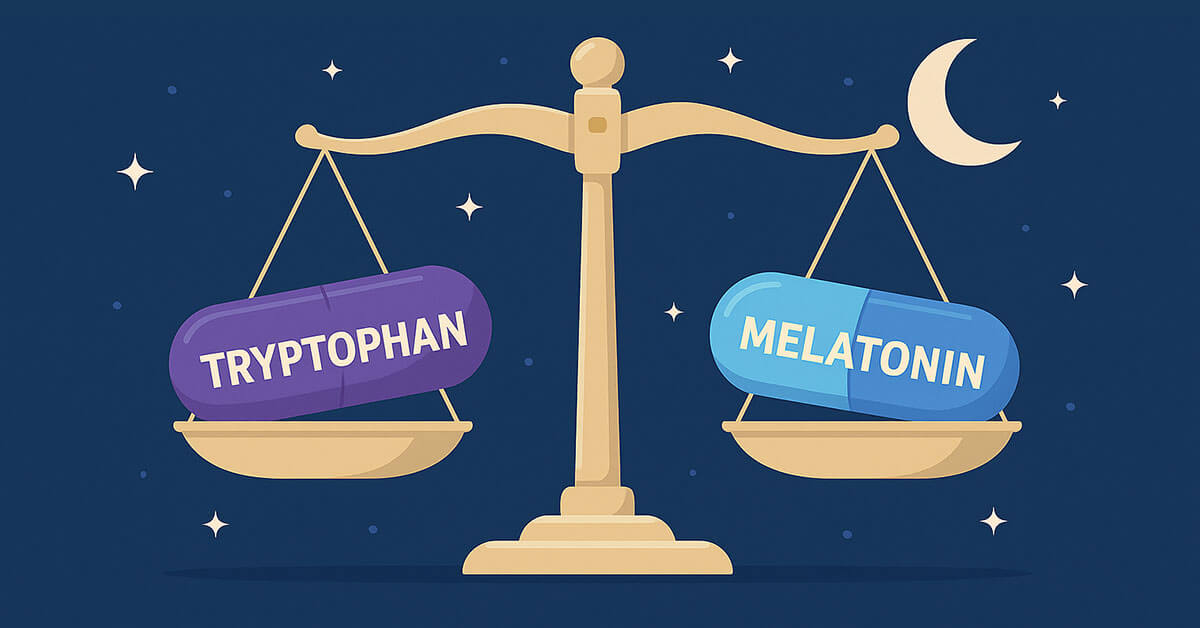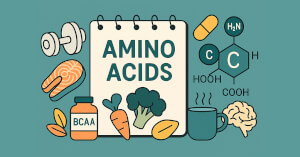
Tryptophan vs Melatonin for Sleep: Which is Better?

If you struggle to fall asleep or wake up feeling unrefreshed, you’re not alone. Millions of people turn to natural supplements in search of better rest. Among the most popular are tryptophan and melatonin. Both are linked to sleep, but they work in very different ways. Understanding how they function can help you decide which one is right for you.
Understanding Tryptophan
Tryptophan is an essential amino acid, meaning your body can’t make it on its own, you need to get it from food or supplements. Once inside your body, tryptophan is converted into serotonin, the “feel-good” neurotransmitter that supports mood, relaxation, and a sense of calm. From serotonin, your body then produces melatonin, the hormone that tells you when it’s time to sleep. In other words, tryptophan lays the groundwork for better sleep and a more stable mood.
Foods rich in tryptophan include turkey, chicken, eggs, cheese, nuts, and seeds. This is one reason why you may have heard about the “turkey dinner effect” after Thanksgiving, it’s not just the big meal, but the tryptophan content that can make you feel drowsy. Supplements provide a more concentrated dose, often used to support people who want a steady, natural boost for sleep and wellbeing.
Understanding Melatonin
Melatonin, on the other hand, is not an amino acid but a hormone your body makes naturally in the pineal gland, deep in your brain. It plays a central role in regulating your circadian rhythm, the internal clock that tells you when it’s time to sleep and when to wake up. Normally, melatonin levels rise in the evening as the sun sets and drop in the morning when light signals your body to be alert again.
When taken as a supplement, melatonin works more like a direct “signal” to your body. Instead of building the foundation for sleep like tryptophan, melatonin tells your brain: “It’s bedtime.” This makes it especially popular for jet lag, night-shift workers, or anyone with disrupted sleep cycles.
How They Work Differently
Tryptophan: The Building Block
Tryptophan is like planting seeds for sleep. It doesn’t make you fall asleep instantly but supports a balanced production of serotonin and melatonin. This means tryptophan can help improve not only sleep quality but also mood, stress resilience, and overall mental wellbeing. Its effects are slower and more subtle, often best for people who want a steady, natural aid rather than a quick fix.
Melatonin: The Direct Signal
Melatonin acts more like a switch. When you take it, you’re essentially giving your body the same chemical message it produces naturally at night. That’s why melatonin often works faster, within 30 to 60 minutes. It’s useful for people who need help falling asleep at a specific time, like when adjusting to a new time zone or recovering from irregular sleep schedules.
Benefits and Best Uses
When Tryptophan Might Be Better
If your main struggle is overall sleep quality, restlessness, or mood-related sleep issues, tryptophan may be the better choice. Because it supports serotonin as well as melatonin, its benefits extend beyond sleep to mental balance. People looking for a more natural, dietary-based approach often find tryptophan supplements helpful, especially if their diet is low in protein-rich foods.
When Melatonin Might Be Better
Melatonin shines when timing is the issue. If you can’t fall asleep at your desired bedtime, if you travel across time zones, or if you work late shifts, melatonin can help reset your internal clock. It’s less about sleep quality and more about aligning your body with a new rhythm. Think of it as a quick “reset button” for your sleep-wake cycle.
Dosage and Safety
Tryptophan: Supplements are typically taken in doses of 500 to 2,000 mg per day, often divided into smaller amounts. Most people tolerate tryptophan well, but it’s important to be cautious if you are on antidepressants or other medications that affect serotonin, as combining them can lead to excessive serotonin activity.
Melatonin: Doses are usually much smaller, ranging from 0.5 to 5 mg about 30–60 minutes before bedtime. More isn’t always better, higher doses don’t necessarily improve results and may even disrupt your natural rhythm if taken for too long. While melatonin is safe for short-term use, experts recommend limiting long-term daily use unless supervised by a doctor.
Which One is Right for You?
The answer depends on your sleep problem. If you’re looking for a long-term, natural way to support sleep and mood, tryptophan might be more beneficial. If you need fast relief for jet lag, travel, or an irregular schedule, melatonin is likely to work quicker. Some people even use both, tryptophan for steady background support and melatonin occasionally when their sleep timing is off. The key is to experiment carefully and, when in doubt, check with a healthcare professional.
Conclusion
Tryptophan and melatonin are both valuable tools for improving sleep, but they serve different purposes. Tryptophan builds the foundation for calm, restful nights by supporting serotonin and melatonin naturally, while melatonin gives your body a clear signal that it’s time to rest. Choosing between them depends on whether you need a steady, long-term boost or a quick, short-term solution. Either way, both can play a role in helping you achieve better sleep and overall health.
FAQ about Tryptophan and Melatonin
Can you take tryptophan and melatonin together?
Yes, some people combine them, but it should be done with caution. Because they act on the same sleep pathway, it’s best to start with a low dose and consult a healthcare provider first.
Is tryptophan safer than melatonin?
Tryptophan is generally well tolerated and works more like a nutritional support, while melatonin is safe for short-term use but less studied for long-term daily use. Both have precautions depending on your health situation.
Which works faster: tryptophan or melatonin?
Melatonin works faster, usually within 30 to 60 minutes. Tryptophan is slower because it has to be converted into serotonin and then melatonin before helping you sleep.
What foods naturally contain tryptophan?
Turkey, chicken, eggs, cheese, nuts, and seeds are all rich in tryptophan. Adding these foods to your diet can naturally support your body’s melatonin production and improve sleep over time.
This article was originally published on Stackbb, your trusted source for science-based supplement guides.






